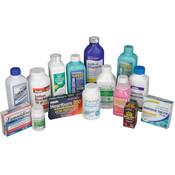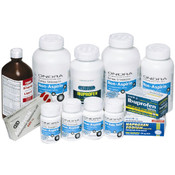It’s a question that needs to be asked. If you are serious about your health and are taking food supplements, vitamins weight loss products and nutraceuticals do you know what you take? Do you know how these product impact your health? Are all these products good for your health? These seems simple, and easy questions, but the answer is very important. In this blog I'll try to explain. Knowing what you take to improve your health requires having access to trustworthy information. As distributors of food- and dietary supplements we tell our customers that they can trust the products we sell. We feel very comfortable in educating our clients about our products. We feel that it’s our responsibility to give them access to information so that they can research and indeed feel confident that what we tell them is in fact true.
"It's our responsibility to give ...information... and feel confident that what we tell them is in fact true!"
Unfortunately, not every vitamin and dietary supplements is good for your health. But how do you know? There are various resources available. Some of these resources are available online, for other resources and information a trip to your local library may be required. But whatever the case, we feel that every consumer needs to make sure that he/she knows about the product they are taking.
One resource I really like is from The International Bibliographic Information on Dietary Supplements. This information is generated by various agencies from the US government. But there are also many European and national resources worth reading.
Naturally, as a senior consultant of the European division of
Vitaelin Nutraceuticals, I'll make sure that information that impacts any of the products we distribute is immediately released to the public. That's, what I feel, is my duty: be honest and fair in health education and information. But, at the same time we encourage our clients to continue researching all the products they take.
A great Database
As mentioned, we like the resources from The International Bibliographic Information on Dietary Supplements (IBIDS). The database prepared by this organization is very complete. It provides access to bibliographic citations and abstracts from published, international, and scientific literature on dietary supplements. IBIDS is collaboration between two US government agencies: the Office of Dietary Supplements of the National Institutes of Health, and the
Food and Nutrition Information Center (FNIC) of the
United States Department of Agriculture's (USDA) National Agricultural Library (NAL).
What is the IBIDS Database?The International Bibliographic Information on Dietary Supplements database is an easy to search free of charge internet resource. It is a collaboration between two government agencies: the Office of Dietary Supplements, National Institutes of Health (NIH) and The Food and Nutrition Information Center (FNIC), The National Agricultural Library (NAL), Agricultural Research Service (ARS), United States Department of Agriculture (USDA)
The database is a "work in progress" with new search terms, abstracts and citations added quarterly and modifications made to the search approach to respond to suggestions from users
ContentAs of September 2007 there are over 760,000 citations on the topic of dietary supplements from four major database sources: biomedical-related articles from MEDLINE, botanical and agricultural science from AGRICOLA, worldwide agricultural literature through AGRIS, and coverage of international applied life sciences literature from CAB Abstracts and CAB Global Health.
Scope
The database generally lists the use and function of vitamin, mineral, phytochemical, botanical, and herbal supplements in human nutrition.It also lists the role of nutrient supplementation in metabolism in normal nutrition and disease states. Furthermore, animal studies that relate to the function of dietary supplements in human nutrition, chemical composition, biochemical roles, and antioxidant activity of botanical and nutrient supplements and fortification of foods with supplemental nutrients and health-related effects are reported.
The database also lists:
- Nutrient composition of herbal and botanical products;
- Surveys on dietary supplement use by various populations;
- The growth and production of herbal and botanical products used as dietary supplements;
- Abstracts where permission has been granted from the publisher;
- Citations from 1986 to the present
- Citations in foreign languages, if the abstract is in English;
- Citations have been selected from multiple databases to ensure that the database is comprehensive and internationally representative;
- Full, peer-reviewed and consumer journal databases;
- Keywords to help you find your topic of interest
- In the future -- citations from additional database sources.
In addition to having records on substances used as dietary supplements, IBIDS also includes records on substances such as niacin and glucosamine used in situations where they may be considered drugs. Such records are included in order to provide information on mechanism of action, possible adverse effects, and other information of potential interest to IBIDS users.
What does the IBIDS database not contain?
- Full journal articles - these may be obtained through your local public or university library or online through journal websites or document delivery services
- All herbal and botanical supplement ingredients - the American Herbal Products Association estimates that there are over 2000 herbal ingredients available in supplement products in the United States. The IBIDS database began with literature on the top 50 botanicals identified by the European Union and now contains literature on over 250 botanicals. These include the best sellers in the U.S. market.
- Complementary and alternative medicine approaches such as homeopathy, chiropractic, massage, and acupuncture. For more information on these topics, contact the National Center for Complementary and Alternative Medicine.
Conclusion
The IBIDS database is just one of the resources we like. There are more resources dealing with information about supplements related to health and healthcare. In the weeks ahead I’ll discuss other resources as well.
If you have any questions or comments, you can contact me directly by sending us an email. For more information visit our website at Vitaelin Nutraceuticals.






